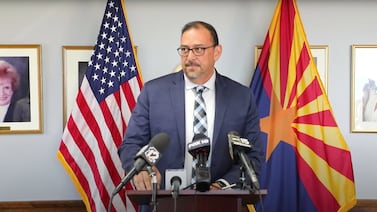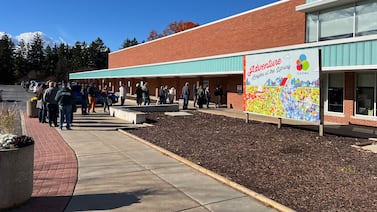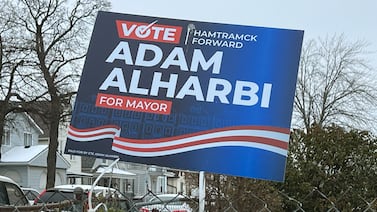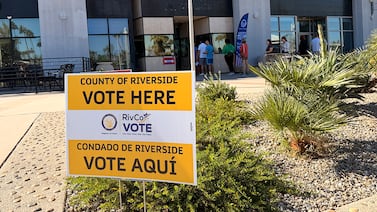This content was co-published with Poynter.
One year ago this week, Americans’ anxiety and uncertainty about the 2020 election was already inching upward when Donald Trump propagated the lie that mail-ballot fraud could cost him his victory and as far-right media began a movement called Stop the Steal.
Also one year ago, a group of 15 reporters around the country got a crash course in a new kind of journalism and started jobs with Votebeat.
Votebeat began as a three-month project of Chalkbeat. The hope of its founders — Chalkbeat’s Elizabeth Green and Alison Go — was to counter the misinformation and confusion about voting during a once-in-a-century pandemic while a norm-breaking president made unfounded claims of voting fraud. The plan was to quickly hire local reporters in eight states, train them on the technical aspects of voting and election administration, and base them at independent media outlets where their work would reach a crucial audience of local policymakers, voting advocates, and voters themselves. No campaign coverage, no polls, no horse race journalism.
To chronicle the intrigue and importance of covering elections in this brand new way, Votebeat reporter Michael Falero talked directly to his fellow journalists who made up the first cohort of Votebeat reporters, to find out what they learned, the stories they uncovered, and what it was like to report on an election like no other. Falero, as an audio journalist based at NPR member station WFAE in Charlotte, North Carolina, recorded the conversations and produced this oral history into a podcast, which you can download via SoundCloud or listen using the player below. A transcript, lightly edited for style and clarity, follows.
It’s October 2020, and 15 Votebeat reporters are gearing up to cover the election across the country. For reporter Marie Albiges, that meant moving from Virginia back to her home state of Pennsylvania to cover what was clearly the pivotal swing state of the election. Albiges said she arrived to find a massive misinformation campaign underway.
“So much of it was directed to Pennsylvania. There were all these new voting laws in Pennsylvania as well,” she said. “And so the idea of helping local communities really get past the misinformation, and make it as easy as possible for them to vote and for them to understand what was happening, was really appealing to me.”
Across the border in New Jersey, Jeff Pillets was calling every election official he could. Pillets was a veteran investigative and statehouse reporter, but election administration was a new beat for him. He found officials scrambling to put in place vague procedures for a mostly by-mail election, a first for New Jersey.
“I just started calling everybody I could on the front lines, all the election workers,” Pillets said. “And that’s when I started to get an education into what this thing is really about, and what the stresses are that these people face on a daily basis.”
Votebeat’s reporters included those with years of experience like Pillets, as well as those new to journalism. But almost all of the reporters had to learn the nuances of local election administration, and fast, with less than a month before Election Day. That meant learning while doing.
Madeline Halpert reported for Bridge Michigan. She felt she brought fresh eyes to her beat.
“Things stuck out to me that might not have stuck out to a veteran elections reporter,” Halpert said. “As I was learning the process, I got to explain the process to the public. So I attended a poll worker training — that was all new information to me. And so I conveyed some of that information to the public so that they could also learn as I was learning.”
The Votebeat reporters had a complex, but important task ahead of them: Tell a nuanced story about how voting was playing out in their communities. 2020 was proving to be a remarkable year for election administration. As the country prepared to run an election during a pandemic, with local officials and voters turning to vote by mail, what did those changes look like on the ground? One common theme reporters saw during the pre- and post-election periods was election staff burning out and quitting in high numbers.
Albiges, at Spotlight PA, heard of officials leaving many county election offices. She documented their stories.
“We knew that we were going to hear this, but it was just listening to them tell us stories about how they would watch staffers sit in the corner and cry because they had voters screaming at them,” she said, “or how these election officials spent hours going through ballots applications in a warehouse somewhere.”
The election administrators had an almost impossible job to do after Pennsylvania legislators passed a law expanding vote by mail, Albiges said. An administrator in a rural county told her they were effectively running two elections at once — one by mail and one in person — but with the same number of staff. All of this, in a year with the highest voter turnout in the state’s history.
“It spoke to the enormity of what they were trying to do under all of this pressure to get a lot done in time or on the deadline that was predetermined for them,” Albiges said. “And it just wasn’t possible.”
Pillets was hearing similar stories from election administrators in New Jersey.
“And everyone seemed to have these stories to tell, about being yelled at, screamed at, doubted. One lady told me she was spit at,” Pillets said. “That was the thing that told me immediately that there were stories here, just among these frontline workers.”
Reporters also fanned out into their communities, talking with organizers, voting groups, and voters themselves. Sojourner Ahebee reported for WURD Radio, which serves Philadelphia’s African American community. She says police killed a Black man in West Philadelphia days before Election Day. She talked to a woman who witnessed it and the fresh round of protests that followed.
“Philly had been protesting since the summer,” Ahebee said. “But usually it was in reaction to other acts of police violence that happened elsewhere, like George Floyd. And now it was here and it was literally outside of her door.”
Ahebee said it was important to bring the pain of the woman and her neighborhood to the airwaves. But she was also able to frame it as a story about voting. Philadelphians were voting on a ballot question about police oversight.
“You know a moment like that can make a Philadelphian feel like they don’t have any control, they don’t have any autonomy,” she said. “But then there was like this very real thing on the ballot that you could literally do a few days later, that might save someone else’s life down the line.”
Election Day arrived fast. Votebeat reporters started early on Nov. 3. They called election officials, ran down hotline tips about possible voter intimidation, and visited polling sites. Halpert said she drove through cities like Flint, Michigan, and more rural towns to talk to voters.
“I had stopped in this kind of very conservative area in the middle of nowhere to talk to some of the last voters as they cast their ballots,” she said. “There was a man I remember who was standing on the top of his truck, screaming ‘God Bless America’ and ‘I love Trump’ into a megaphone. And he told me he had been there all day doing that. So he kind of got the last of it.”
Halpert said reporting that day wasn’t glamorous. As people watched election returns on TV, she was working in a small town parking lot.
“I wrote up everything that I had seen that day in my car, in that parking lot,” she said. “So it was kind of funny, everybody around me was sitting there waiting for the results, and here I was writing in my car. But we also knew that we weren’t going to have the results that night.”
Halpert and other Votebeat reporters saw that after weeks of early voting and people voting by mail, Election Day itself was eerily quiet. The next few days proved more interesting.
Officials continued to process ballots after record-high turnout. And President Donald Trump began claiming the election had been stolen, starting on the night of the election with those now-historic words. “This is a fraud on the American public,” he said to a room of supporters and press at the White House. “This is an embarrassment to our country. We were getting ready to win this election. Frankly, we did win this election. We did win this election.”
Ahebee witnessed a protest by Trump supporters, who were then confronted by liberal voters and activists outside the Pennsylvania Convention Center in Philadelphia on Nov. 6. She said the energy of the protest became lighter as people started to celebrate Joe Biden’s impending victory.
“There was music and a DJ, like it was part rave, part protest. All these international news media were there, folks from the BBC, from all over the world,” she said. “It was just like this really wild moment of all of these sort contested things coming to abut, and just erupting outside of where our election was essentially taking place.”
Votebeat reporters weren’t done after the presidential race was called. There were election certifications in November, and state and local races had recounts. Reporters faced a new challenge. With many unfounded conspiracies about election fraud taking root, including from the president himself, how should reporters confront misinformation? Halpert wrote a comprehensive story in December that debunked 13 voting fraud myths.
“I was talking to a county clerk and he said, ‘You know, I’ve saved it on my bookmarks bar in my computer, and then when a voter calls me about fraud, I can just go to that article and figure out what the truth is,’” she recalled.
Christopher Alston covered Georgia for WABE, the NPR station in Atlanta. He stayed busy after Election Day, given Georgia’s two Senate runoff elections on Jan. 5. The state became the center of a heated campaign and Republican infighting, not to mention misinformation about voting fraud, for months.
“The trouble we ran into over and over again was, how do we talk about these conspiracy theories without giving credibility to them,” Alston said, “when they’ve clearly been debunked?”
Alston said his approach was to stick to the facts. In many of his stories after Nov. 3, he talked to voting experts and companies like Dominion, whose machines were used in Georgia in 2020, to check the fraud claims he was hearing from Republican officials and many voters.
“And that’s, I think, when it really became clear that a lot of the claims didn’t even suggest an understanding of how the elections worked,” he said, “how the machines functioned or how the process goes.”
Ahebee was looking at data for her post-election stories. She had difficulty getting race-specific voter data focused on Philadelphia from the government.
“It wasn’t available,” she recalled. “And then I was like, OK, is it that they’re not giving it to me? Or is it that they’re actually not collecting it? And then it became really clear that they’re not even collecting it.”
The discovery led Ahebee to write an article about how a lack of data on voter demographics hinders election reform. She said data became essential to telling stories about Pennsylvania voters, because the state had a close election where small changes in voting trends could have a big impact.
“And of course, data becomes a story and data feeds into all of our other narratives and cultural attitudes about certain groups of people,” Ahebee said. “And so it was really important for me to make sure what I was saying was true, and that was reflective of what actually happened.”
Then, on Jan. 6, right-wing extremists and supporters of President Trump stunned the nation by rioting at the U.S. Capitol to protest the certification of the election. In Michigan, Halpert was saddened by the violence she saw, but she wasn’t surprised. She was in the middle of writing a story about the increasingly violent threats local election administrators received in the aftermath of the November election.
“I re-evaluated my article about threats on election officials,” Halpert said, “and was able to kind of show this broader story of, ‘What happened yesterday was shocking, but not to election and public officials in Michigan who have been fearing for their safety for months.’”
At the start of Votebeat, Pillets admitted he thought voting and election administration might not require a full-time reporter. But by the end, Pillets had more stories than he had time to write them. He also felt he got closer to the heart of New Jersey’s election story by December.
“And it was only by the end,” Pillets said, “that I came to realize that in New Jersey, aside from the problem with the workers, that had been the story. But the real ongoing issue in New Jersey is the poor administration with the lack of expertise in the voting administration, specifically with a few individuals.”
Pillets says this was the genius of Votebeat: to place local reporters at the level where voting and elections happen, to report on what’s working and uncover what isn’t.
“Reporters have a lot of power,” he said. “You know, a good local report has the power to ask questions, and to change things and to just shed light on stuff. And it reminded me of that.”
Alston in Atlanta agreed that Votebeat’s value came from its local focus.
“It served an incredibly important role in terms of highlighting local election issues that are widely different across the country but have very tangible effects on who and how people are able to vote,” he said.
For Albiges, Votebeat was in local communities at the exact moment when they needed a trusted source to explain voting to them.
“Election administration itself is very complicated, and very nuanced and very local,” she said, “and Votebeat understood that. And that’s why they dedicated these reporters to cover this topic that really goes down to the local level.”
Votebeat was created with the belief that fact-based, local news about voting would be critical to addressing misinformation about and mistrust in the 2020 election. After the attack on the U.S. Capitol, we understood that conspiracy theories and pushes for voter disenfranchisement continue to be powerful trends in American politics. Local news is urgently needed to remedy them.
With the lessons of 2020 in mind, we are now fundraising and preparing to relaunch Votebeat to cover the 2022 midterm elections, with a focus on many states’ new restrictions on voting, the spread of misinformation, and the subversive threats to election integrity.






